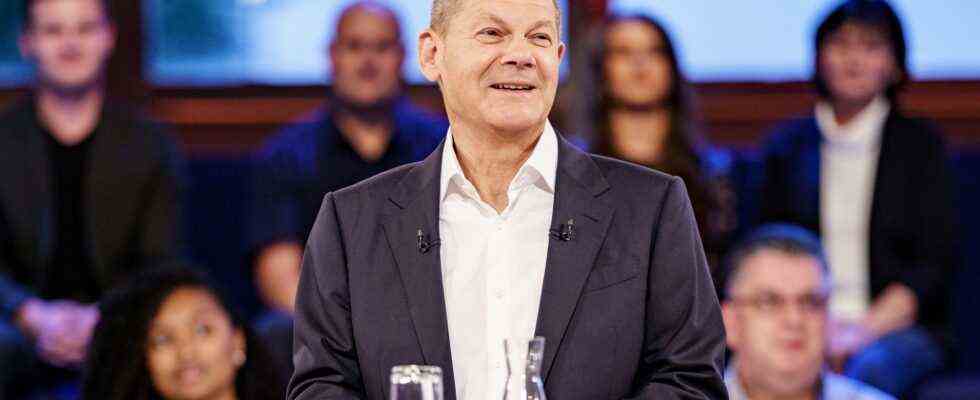analysis
Status: 07.09.2021 11:59 p.m.
Olaf Scholz has to turn from Vice Chancellor into hope for the future, to distance himself from Merkel. In the ARD election arena he didn’t even try to do that, but pretended to be citizen-oriented and statesmanlike. Just like Merkel.
Probably the trickiest moment in this election arena with the incumbent finance minister and SPD chancellor candidate Olaf Scholz triggers a tax official. When asked, which was initially more of a provocation, Scholz put on his poker face: friendly, few facial expressions, as it were unmoved, he listens to the questioners. The 58-year-old Lübeck-born states that he benefits from the mistakes of the competition: “You have the advantage, Mr. Scholz, that your mistakes are hardly communicated to the public, and that they are hardly understood because they are about difficult economic conditions so complicated issues that hardly anyone understands them “- and lists: the CumEx scandal, the Wirecard scandal and the G20 summit riots that happened during his time as Hamburg mayor. The official asks Scholz whether he, as a politician, can be trusted that such mistakes will no longer happen in the future?
It is already halfway through the voting arena – and there are still many questions waiting in the audience with raised hands. Scholz probably suspects that there will not be enough time to conjugate all three complexes of topics. And as usual, when he is asked about these topics, he answers: He just briefly addresses the Wirecard scandal, “a major fraud in which the company management invents billions in sales” – and counts in the plural “we” how quickly everyone the relevant laws and powers of attorney for government financial supervision were subsequently changed. But there was still a question of trust, moderator Andreas Cichowicz says. Scholz says yes, that’s why he wants to provide the facts – that is better than simply saying nicely: “Look me in the eye.”
Circumnavigated cliff
Taken a cliff or rather avoided it, somehow, next topic. In the electoral arena, the audience determines the topics and questions, the moderator team only accompanies – unlike in the Triell. A lot is at stake for Scholz: If he does not get a good result for the SPD in this federal election, many see the former and oldest people’s party in the country in a serious existential crisis. At the moment, the survey situation is comfortable for him and the party, but Scholz knows how quickly a lull in the survey can set in again.
Unlike his green challenger Annalena Baerbock in the previous election arena on Monday evening, he actually had to master a difficult change: The representative of the previous government and Merkel’s vice chancellor had to present himself as a new hope for the future – as someone who does everything differently and better. Not an easy task to peel off this heavy coat.
Scholz solves this for himself by not even trying. Scholz’s reaction pattern in the electoral arena reminds political scientist Thorsten Faas of Merkel’s previous appearances in the electoral arena: first listen carefully and express understanding for the problem being raised, then emphasize what has already been achieved politically – and finally signal which political tasks still need to be solved .
Thorsten Fass, political scientist FU Berlin, with an analysis of the election arena with Olaf Scholz
tagesschau24 9:30 p.m., 7.9.2021
Scholz is conspicuously specific and honest about an educational question from one of the schoolchildren: “The truth is that we would have needed this digital pact much earlier”. There are few moments in which he becomes so specific and self-critical, otherwise he likes to stay a bit foggy. When it comes to the long-term care reform, he doesn’t even mention that the SPD wants to abolish private health and long-term care insurance and transform it into a general citizen’s insurance.
Interesting especially what he doesn’t mention
What is particularly interesting about Scholz’s appearance is what he doesn’t say. He does not even mention the party names of possible coalition partners – the Greens or the FDP – not even the name of the incumbent Chancellor. In general, he does not want to comment on coalitions, neither completely ruling out a coalition with the Left Party, nor a further grand coalition. There are tactical reasons for this, but in the case of the Left Party, he is also bound by a party congress decision.
The 63-year-old, who recently described himself as a “type of objective politician” in an ARD documentary, can show closeness to the citizen, perhaps even empathy. In some places he succeeds, even if he clearly has trouble making eye contact immediately after a question – he often looks down first before looking up.
A mother asked how he wants to make up for educational losses from the pandemic and at the same time take the pressure and fear away from the schoolchildren. “I think you are describing a very serious topic – it pained me very much that the young people could not go to school because of the Corona precautionary measures”. Or when he promises a desperate employee of a privately organized aid initiative from the Ahr valley that he should contact him “if you have the feeling that things are not going well”.
After Annalena Baerbock and Olaf Scholz, Union Chancellor candidate Armin Laschet will enter the election arena on Wednesday, September 15, also at 8.15 p.m. in the first.
ARD election arena – with Olaf Scholz
7.9.2021 10:22 p.m.

